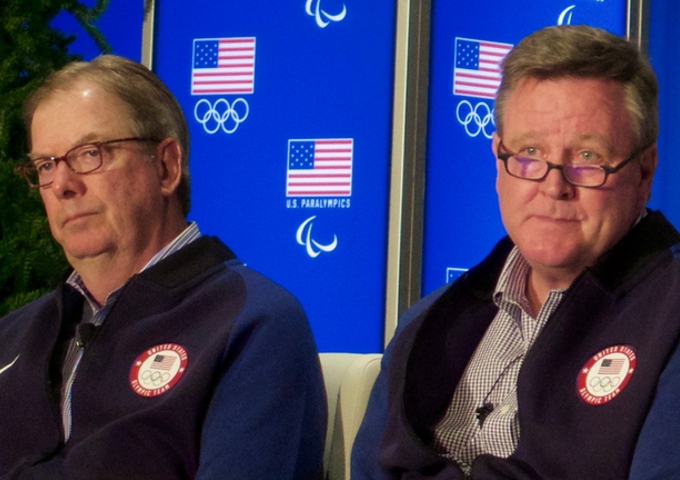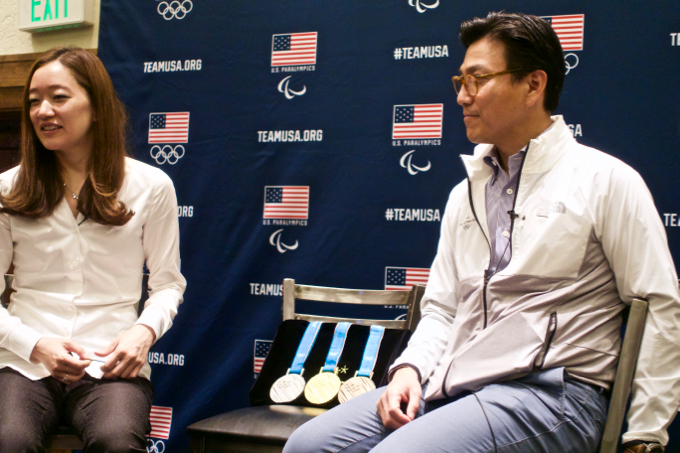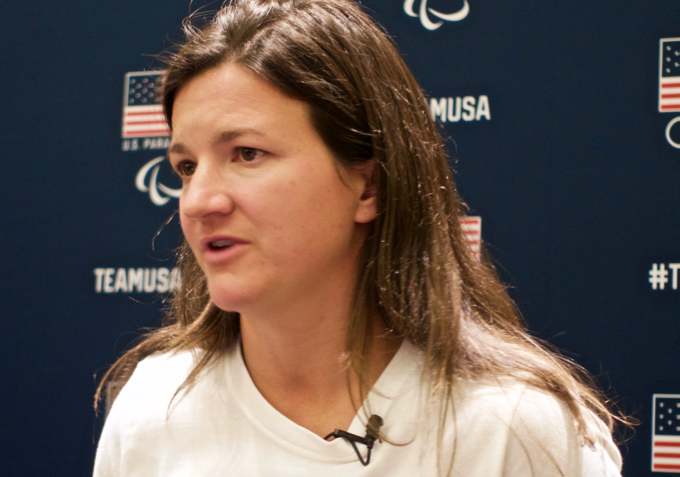Security, political anxiety part of ’18 Winter Games
By Susan Wood
PARK CITY, Utah – Despite a war of words between the United States and North Korea, U.S. Olympic officials and winter athletes all but shrugged off the danger of a nuclear threat affecting the Games in South Korea in February.
Team USA and representatives from the PyeongChang Games on Sept. 25 discussed the current matter among other issues during the media summit at Park City.
After all, the Olympics is an event born as a symbol of unity and goodness in humankind.
Missile- and Twitter-launching threats between President Donald Trump and North Korea leader Kim Jong-un, with its southern neighbors caught in between, have led to questions about whether the Games would be safe.
This is not the first time the Olympic Games have felt the effects of international relations gone awry.
In 1972, the Summer Olympics in Munich experienced a massacre when 11 Israeli Olympic team members were taken hostage and eventually killed at the hands of a Palestinian terrorist group called Black September.
On the domestic front, the Games in Atlanta in 1996 were marked by an explosion of a bomb in Centennial Park, killing two and injuring more than 100 others.

USOC Chairman Larry Probst and USOC CEO Scott Blackmun talk about security for the 2018 Winter Games on Sept. 25. Photo/Kathryn Reed
A strong resolve and heavy hand in security are expected to protect the upcoming Games. Still, a sports minister in France has a large enough concern to question whether the nation would pull out, the Los Angeles Times reported days ago.
To that, U.S. Olympic Committee Chief Executive Officer Scott Blackmun told Lake Tahoe News at a filled press conference “the statement was taken out of context.” He pledged diligence from Olympic officials to lock down the Games to danger with a constant reliability on law enforcement and wisdom of the International Olympic Committee.
“Should the unthinkable happen, it’s the issue of the IOC,” he said.
USOC Chairman Larry Probst countered the qualified suggestion of danger a quasi whim from the French official. He declared it would be “highly unlikely (France) would pull out.”
When asked whether athletes approached the USOC about the matter, officials quickly responded with “not one.”
U.S. halfpipe snowboarder Kelly Clark, a veteran of four Olympics, seemed undeterred by the perceived threat. She remembered competing in her first Olympic Games in Salt Lake City five months after 9/11.
“Based on my experience, the United States makes the right decisions to make the athletes safe,” she told Lake Tahoe News. “I saw the power of sport and what it can do – especially the Olympics. It brings the world together. People put their differences aside and celebrate sport.”
South Korea would be her fifth Olympics. She has experienced a variety of security protocols but “has always felt safe.”

PyeonChang Olympic spokeswoman Nancy Park and POCOG Executive Vice President Jaeyoul Kim are confident athletes, spectators and others will be safe during the Games. Photo/Kathryn Reed
U.S. bobsled competitor Aja Evans also shared her faith in officials to keep her protected.
She was joined by Olympian Mikaela Shiffrin who insisted she plans to concentrate on her sport.
“Right now it doesn’t look like the political tensions are going to have an effect on the Olympics. I’m thankful because I want to compete on that stage,” Shiffrin said.
But U.S. biathlete Susan Dunklee appeared more skeptical of international relations running smoothly.
“I think we’re not able to see the whole situation, and it could change at any time,” Dunklee told LTN. She added the spectrum of possibilities could even accelerate to the point the United States “may not even go.”
Alpine skier Julia Mancuso, an Olympic veteran who hails from the slopes of Squaw Valley, provided the perspective that every Olympics has the potential of some kind of threat. In visiting South Korea for a test run on the courses with the other athletes, Mancuso compared the Asian nation to Russia.
“I felt really safe at South Korea,” she mentioned, further commending organizers for essentially seeming prepared. The Games in Sochi had a less secure feel that she had to overcome.
This could be music to the ears of PyeongChang 2018 Games officials.
“We appreciate the confidence the USOC has in us delivering a great Games,” POCOG Executive Vice President Jaeyoul Kim said. He pledged to LTN during the summit that South Korea has “taken all the necessary precautions to deliver a safe and secure Games.”
Raising the bar, Kim went on to insist POCOG and IOC officials are working diligently with military police and international security teams to avert any disaster. And they’re all about sharing information – the power of knowing. He noticed the potential of enhanced “intel sharing” at the Rio Summer Games in 2016.
In these circumstances, a beefed up evacuation plan would be in order. Kim said his government has complied.
POCOG spokeswoman Nancy Park noted “everybody has the same concerns.”
Park clarified security has always been important.
“It’s just that it’s never been out in the forefront (until now),” she said.
Nonetheless, this tension at some level must have escalated to at least a heightened awareness. The name of the location has been altered for the Olympics. Local leaders were apparently afraid international visitors would confuse Pyeonchang, a county in eastern South Korea, with Pyongyang, the capital of North Korea, NBC reported. That’s why the spelling has been changed to PyeonChang.
Apparently, the Unforgotten War isn’t all forgotten. In 1953, the Korean War ended with not a peace treaty but a truce – a temporary pause in fighting. Back then, North Korea invaded South Korea with the blessing of the Soviet Union and China. The United States served to support the south.
Trouble on the home front
Adding to the tension of present-day politics at home, Trump has fueled the fire of civil discourse with provocative tweets to North Korea.
Policies out of the White House have prompted far-reaching peaceful protests – in particular among national athletes. From the NBA champions Golden State Warriors declining a traditional visit to the latest surge in National Football League players taking a knee as a gesture of disapproval, U.S. protests became a topic at the media summit.

Kelly Clark of Mammoth trusts officials to provide the requisite security for athletes. Photo/Kathryn Reed
“One of the proudest parts of being an American is freedom of speech. I’m proud of athletes who stand up for what they believe in,” Mancuso said.
She further clarified though it may be more appropriate for athletes who compete every week such as the NFL players to carry on such a gesture rather than Olympic athletes who may take a stand only to wait four years to continue to take another.
And as icons of their country, athletes may see these issues as multi-dimensional in which aspects of solidarity can be agreed upon.
Alpine skier Laurenne Ross demonstrated the complexity of the issue when asked if she would visit the White House, an invite her fellow athlete Clark would certainly accept again.
“I would go. It doesn’t mean I love what is going on there,” Ross said.
She believes people have the right to freedom of expression, and that’s one of the great things about the country she’s representing.
But the Olympics has a code of conduct. Rule 50 of the Olympic Charter states: “No kind of demonstration or political, religious or racial propaganda is permitted in any Olympic sites, venues or other areas.”


